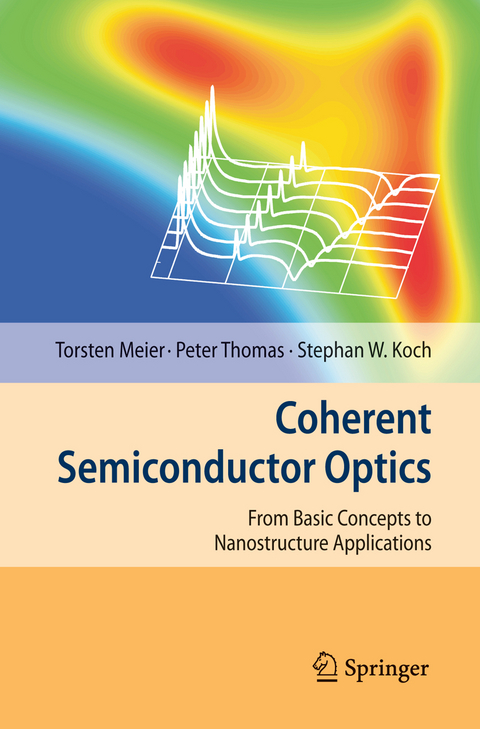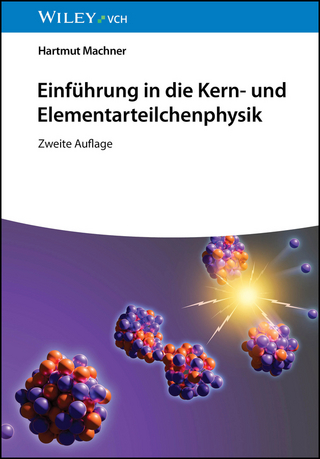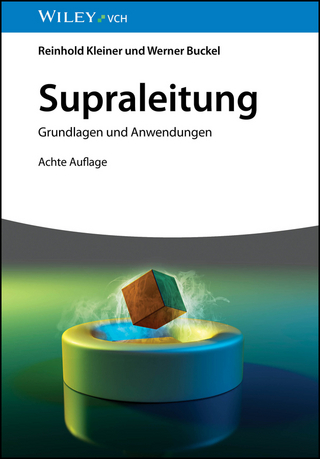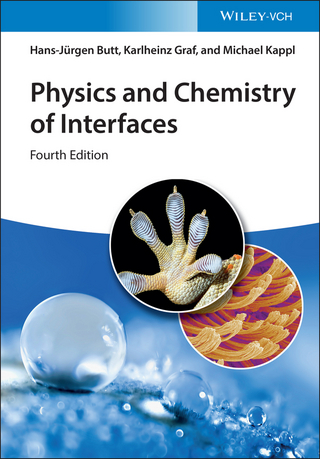
Coherent Semiconductor Optics
Springer Berlin (Verlag)
978-3-642-06896-6 (ISBN)
This book could not have been written without the extensive work of many diploma and Ph.D. students in our Theoretical Semiconductor Physics Group at the Philipps-Universit¨ at in Marburg. They have contributed to the f- damental understanding and to many applications in the area of coherent semiconductor optics. The one-dimensional tight-binding model, which is exclusively treated in the present book, has been the basis of many of their diploma and Ph.D. theses. The reader will ?nd references to their results and also their names as authors of the publications listed in the sections "S- gested Reading". In particular, the authors wish to thank Irina Kuznetsova, who prepared a large number of the ?gures and recalculated the underlying data on the basis of the equations presented in this book in cases where parameters or presentation had to be changed and/or optimized. Someoftheproblems,inparticular,thoseconnectedtothemoreintrod- tory chapters, were solved by Swantje Horst and Joachim Kalden. They made valuable suggestions for improved formulation of the problems and pointed out a number of hints we should give our readers in order to help them with the solutions. Furthermore, we wish to thank all our numerous collaborators, together with whom we have performed research in the area of coherent semiconductor optics in the past and present, for many valuable discussions. In particular, without the close cooperation between experiment and theory this research ?eld would not have advanced to the present level.
Stephan W. Koch ist Physikprofessor an der Philipps-Universität Marburg und Adjunct Professor am Optical Sciences Center der Universität von Arizona, Tucson/USA. Nach seiner Promotion 1979 an der Goethe-Universität in Frankfurt arbeitete er als Gastwissenschaftler an dem IBM Research Laboratory in San Jose/USA und erhielt nach seiner Rückkehr und Habilitation in Frankfurt ein Heisenberg-Stipendiat der Deutschen Forschungsgemeinschaft. 1986 begann er seine Tätigkeit an der Universität von Arizona erst als Associate Professor und ab 1989 als Full Professor. 1993 folgte er einem Ruf auf eine Professur für Theoretische Physik nach Marburg. Seine Fachgebiete umfassen die Theorie der kondensierten Materie, optische und elektronische Eigenschaften von Halbleitern, Vielteilchen-Wechselwirkungen, Halbleiternanostrukturen, kohärente und ultraschnelle Phänomene, die Theorie von Halbleiter-Lasern, Mikroresonatoren und photonischen Kristallen sowie quantenoptische Effekte in Halbleitern. 1997 erhielt Stephan W. Koch den Leibniz Preis der Deutschen Forschungsgemeinschaft, 1999 den Max-Planck Forschungspreis der Humboldt Stiftung und Max-Planck Gesellschaft.
Preliminaries.- Experimental Techniques.- Few-Level Systems.- Coherent Tunneling.- The Semiconductor Model.- Single-Particle Properties.- The Equation of Motion Approach.- Dynamical Equations for Semiconductors.- Applications I.- Linear Optical Response.- Coherent ? (3) Processes for Level Systems.- Coherent ? (3) and ? (5) Processes in Ordered Semiconductors.- Coherent ? (3) and ?(5) Processes in Disordered Semiconductors.- Coherent Excitation Spectroscopy.- Character of Continuum Transitions.- Applications II.- The Semiconductor with Applied Electric Field.- Mesoscopic Semiconductor Rings.- Coherent Density Dynamics in Disordered Semiconductors.- Current Echoes.- Problems.
From the reviews:
"This book presents a comprehensive theory of coherent processes in semiconductor optics. ... The book is very well organized and chapters on basic theories are condensed which makes it easy for readers to understand the ideas in progressive stages. ... The book may be regarded as self sufficient in covering the topics on semiconductor optics. ... The book may be expected to be very useful for graduate students and researchers interested in the theoretical principles in this field." (Jai Singh, Australian Physics, Vol. 44 (2), 2007)
"The text ... represents the culmination of many years of teaching experience and world-leading research in theoretical semiconductor optics. ... The text is aimed for advanced class work for graduate students or self-study by experienced researchers. A collection of problem is provided at the end of the text, and each chapter ends with a list of suggestions for further reading. The text is well illustrated, and a good index is provided." (Dr M. Fox, Contemporary Physics, Vol. 48 (4), 2007)
| Erscheint lt. Verlag | 14.10.2010 |
|---|---|
| Zusatzinfo | XIII, 319 p. |
| Verlagsort | Berlin |
| Sprache | englisch |
| Gewicht | 496 g |
| Themenwelt | Naturwissenschaften ► Physik / Astronomie ► Atom- / Kern- / Molekularphysik |
| Naturwissenschaften ► Physik / Astronomie ► Elektrodynamik | |
| Naturwissenschaften ► Physik / Astronomie ► Optik | |
| Schlagworte | Coherent phenomena • LED • Mechanics • Nonlinear Optics • Optical properties of nanostructures • Optics • quantum mechanics • semiconductor • Semiconductor optics • spectroscopy |
| ISBN-10 | 3-642-06896-0 / 3642068960 |
| ISBN-13 | 978-3-642-06896-6 / 9783642068966 |
| Zustand | Neuware |
| Informationen gemäß Produktsicherheitsverordnung (GPSR) | |
| Haben Sie eine Frage zum Produkt? |
aus dem Bereich


